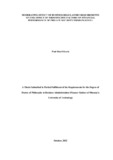Moderating Effect of Business Regulatory Requirements on The Effect of Firm Specific Factors on Financial Performance of Private Security Firms in Kenya
Abstract
Even though Kenya enacted Private Security Regulatory Act of 2016, majority of private security companies have continued to operate without complying with the regulation thus inhibiting their performance. For private security firms to survive and thrive, they need to be provided with a friendly business climate. The research therefore investigated the effect of firm specific factors and business regulatory requirements on the financial performance of private security firms. The firm specific factors included firm’s financial aspects, entrepreneur’s attributes and firm’s characteristics, making the independent variables. In the study, business regulatory requirements were the moderating variables. Business regulatory requirements included finance access regulations and private security industry regulation. The research findings will be useful to various groups including academia, government and management of private security firms. The research was guided by public interest, credit access, scale efficiency, Miller- Orr model and social network theories. Further, the research was based on descriptive survey research design. The study population was 75 private security firms operating in Kenya forming the census with no sampling being carried out. The study made use of primary and secondary data with primary data being sourced using structured questionnaires. The instrument was taken through pretesting to ensure validity and reliability of each construct measurements before actual study. Statistical tools including frequency distribution, mean, standard deviation and coefficient of variation were used as descriptive statistics. Multivariate OLS regression was applied to examine the effect of firm specific factors on financial performance. Stepwise regression was adopted to examine the moderating effect of business regulatory requirements on the relationship between firm specific factors and financial performance. The study established that firm financial aspects had a significant direct effect on financial performance of private security firm in Kenya. The study also revealed that firm entrepreneur attributes had a direct significant effect on private security firms’ financial performance in Kenya. The study also noted that firm characteristics had a significant direct effect on private security firms’ financial performance. Finance access regulations did not have a significant effect on the effect of firm specific factors on financial performance. Further, private security industry regulations had a significant moderating effect on the effect of firm specific factors on private security firms’ financial performance in Kenya. The study thus concluded that all firm specific factors significantly explained financial performance of private security firms in Kenya. The study also concluded that finance access regulations was not a moderator of the effect of firm specific factors on financial performance of private security firms in Kenya. Further, the study concluded that private security industry regulations moderated the effect of firm specific factors on financial performance of private security firms in Kenya. The study recommends that private security firms should enhance their financial aspects such as improving their cash flow and having financial statements audited. The owners of private security firms should enhance their entrepreneur attributes such as networking and financial literacy. The study also suggests to management of private security firm to enhance their firm characteristics such as firm size. The research also noted that the management of private security firms ought to align their operations with private security industry regulations such as minimum wages and training for staff to enhance their financial performance.

